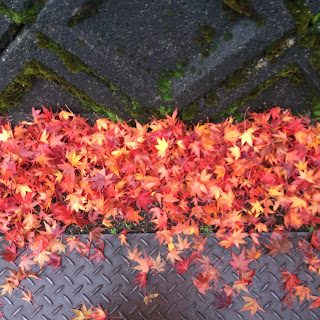Poem Meaning and Background
 |
| Fallen momiji leaves, photo by me |
ちはやぶる・かみよもきかず・たつたがわ
chihayaburu・kamiyo mo kikazu・Tatsuta-gawa
からくれないに・みずくくるとは
kara kurenai ni・mizu kukuru to wa
~Ariwara no Narihira Ason
Translation
Even when the gods
Held sway in the ancient days,
I have never heard
That water gleamed with autumn red
As it does in Tatsuta's stream
Meaning
Narihira wrote this poem as "Screen Poem" for Fujiwara no Takaiko, a consort of Emperor Seiwa. Screen poems were written using the scene on a folding screen as the subject, then that poem could be used to decorate the screen. This poem is directly describing the image that was painted on Takaiko's screen with grand and vivid descriptive language. However, it is written in The Tale of Ise that Narihira and Takaiko were secret lovers, so one interpretation of this poem is that this poem is actually a hidden allusion to a deep, burning passion for the woman who would read this poem on her screen.
In this poem "chihayaburu" is what is known as a "pillow word" (makura kotoba), which is a kind of decorative word used in waka poetry. It doesn't have a direct translation because it is meant to "decorate" the word that it precedes. In this case, the word gives off a sort of vivacious and powerful energy, especially since it is describing Kami-yo (the age of the gods). Karakurenai is word that means a crimson red. Mizu kukuru means that the water is being dyed red by the momiji leaves being carried along by the river's current.
Author
 |
| A depiction of the author and his poem by the artist Agameishi |
Narihara is the protagonist in The Tale of Ise, and the story depicts him as having several high profile love affairs, including one with Yasuko, a high priestess of Ise shrine, and Ono no Komachi, author of poem [9], Hanano. It is hard to know how much of these legends are true, but they have promoted Narihara's image as a prolific lover.
Comments
Post a Comment